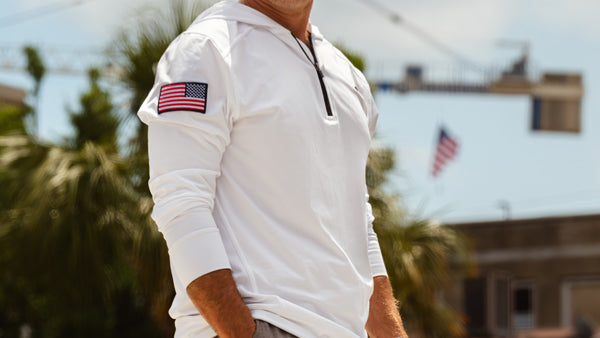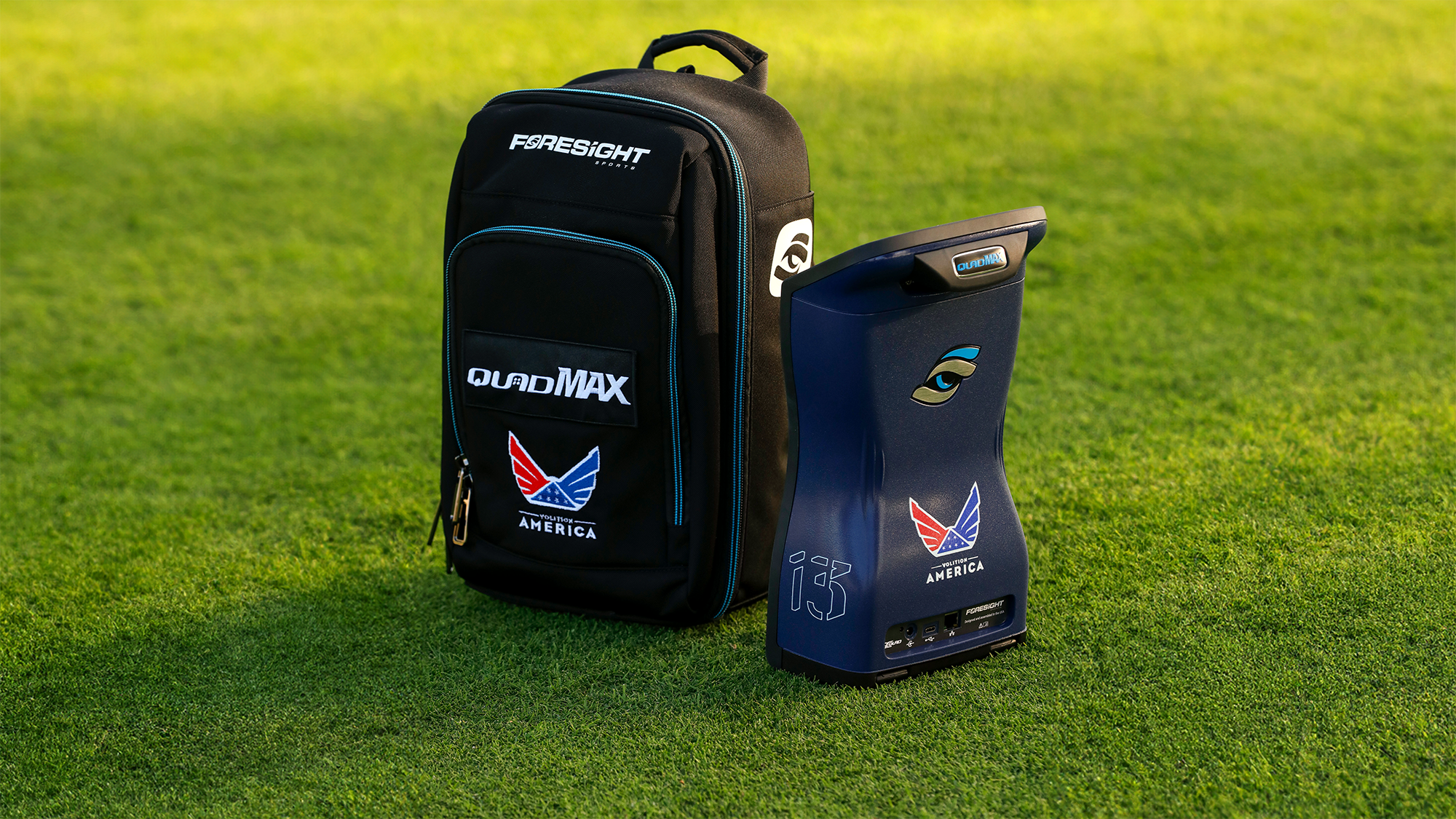Volition America: Brand Built On Giving Back To Heroes Hits Decade Mark

Gary Woodland and Tiger Woods of the United States stand on the third hole during the final round of the 2018 PGA Championship at Bellerive Country Club on August 12, 2018 in St Louis, Missouri. (Photo by Stuart Franklin/Getty Images)
John Sapiente, the serial entrepreneur behind automotive component maker Elgin Die Mold and Trident Manufacturing, a contract manufacturer of medical devices, had what he dubs his ‘patriotic awakening’ after a round of golf.
This was no ordinary eighteen holes. At the behest of friends, the Illinois based businessman found himself at a Folds Of Honor gala dinner one evening, where he set his sights on winning an auction to play in a Pro Am with 13-time PGA Tour winner Craig Stadler.
While hitting balls alongside “The Walrus,” over Memorial Day Weekend, a player he’d long admired, was a lot of fun, the real highlight reel moments turned out to be the quality time he got to spend hanging out with military families. He came away from that experience with the realization that all his life he’d taken the holiday for granted and that the mission of Folds of Honor, a nonprofit that provides scholarships to the families of fallen or disabled service members and first responders, was a very worthy cause that deserved a lot more attention.
After the event Sapiente became an active donor to Folds of Honor and formed a close friendship with the charity’s founder Lieutenant Dan Rooney, a PGA Professional and F-16 fighter pilot who flew three combat tours in Iraq. Dan shared a vision to build a brand to support the charity and implementing it became Sapiente’s mission.
“Every American lives under a blanket of freedom because of what our military and first responders do and why aren’t we all rallying around supporting them. Why isn’t this a universal thing for all Americans? That was why I decided, I’m all in. What do we need to do. We built a brand out of choosing America, and a percentage out of everything we sell goes back to helping those that gave us the freedom to choose,” Sapiente said.
The original concept for Volition America , founded in 2014, revolved around selling jeans, T-shirts, and belt buckles. But it didn’t take long to realize that breaking into the apparel business via denim posed significant challenges and a steep learning curve. Pivoting quickly, the brand shifted focus to golf—a sport where their mission-driven model resonated right off the tee.
Sapiente recognized that Volition America was more of a movement than an apparel brand and its partnership with the Folds of Honor Foundation gave the brand a unique story to tell. Cracking into a competitive space, however, required more than just inspiration. His research revealed that 80% of golf apparel sales came through green grass accounts, so he devised a strategy to tap into this critical channel. Rolling up his sleeves, Sapiente began schlepping bags of polos from pro shop to pro shop, striking up relationships and closing deals.
He describes the early days pounding the pavement between golf courses as “daunting” but he knew from the networking he’d done with corporate leaders, CEOs and other high level apparel industry insiders that the brand had merit.
“What was really interesting is they were all very complementary of the idea and the brand. So, I knew I had whitespace and I thought, ‘what if we collabed with a major golf brand?’” Determined to make it happen, he began cold calling companies—a hustle that eventually led to a meeting with the Cobra/Puma team in Carlsbad. They bit.
“They basically signed a licensing deal on a logo and an idea. Usually, a brand comes in and you have an audience. But they understood the power of what we were infusing in their brand: inspiration, cause and a storytelling opportunity—we could do some good and sell some product.”
The collaboration gained major momentum in 2018 when PGA Tour star Gary Woodland, who had finished up his Under Armour deal and was between clothing contracts, reached out.
“He called us up and said ‘can I wear your stuff for free while I’m looking for my next deal?’ because he believes in the Folds of Honor and the American Volition mission and we’re like ‘oh hell yah!”
A few weeks later Woodland was paired with Tiger Woods on the Sunday of the PGA Championship. While Tiger would finish as the tournament runner-up and Woodland ended up in a four-way tie for sixth place, the ample T.V. time the duo garnered that afternoon proved invaluable.
“Puma saw this giant spike in sales that they normally wouldn’t see and it was clear to us that the Volition America brand DNA was resonating more with people with Gary in it,” Sapiente recalled. Then in 2019 Woodland came aboard as an official ambassador and that year he won the U.S. Open.
“The week after, the sales were remarkable. Having him walk up 18 and Jim Nance talk about Folds of Honor and Volition America, and what it means, it was a really unbelievable moment for me to see come to fruition.”
Reflecting on Volition America’s growth from a 30,000-foot view, Sapiente notes that the brand’s approach came together more through trial and error than by design. It has incorporated elements of three iconic business models: Toms Shoes' giving-back ethos, Fanatics' role as the go-to hub for sports merchandise (he sees Volition as the Fanatics of patriotic gear), along with Supreme's collaboration-driven appeal. These influences have shaped a brand that cross-pollinates its partnerships and purpose.
Today, their brand partnerships include Luminox, Revo, Lizard Skins, Victus, Marucci and most recently Foresight created a special Volition America version of their Quad Max Launch Monitor.
Volition America products are found online and in over 2000 golf pro shops around the country. Over the past twelve months, Volition America has raised over $1.3 million for Folds of Honor. Partial proceeds of each sale go to Folds of Honor and when that is via a royalty deal, 13% of that revenue flows to Folds. The figure was chosen because an American flag is folded thirteen times into a triangle shape during military funerals and other ceremonies to represent the thirteen colonies and stripes on the flag. The number crops up often in Volition’s brand messaging, often for educational purposes.
“We don’t charge more than a normal company would charge for a licensing fee. The idea was really to raise money for Folds. It wasn’t about building this highly profitable business—I’ve already got my day job—this was about giving back, building a movement to unite the country and helping those that help us.”
The ultimate vision for Volition America is to expand its mission, offering patriotic gear that resonates with Americans across a variety of activities—whether it’s golf, fishing, tennis, or skiing—giving them a way to showcase their pride and literally wear their values on their backs.
“We’ve got eight major potential new collabs coming that will massively increase our reach across all sorts of different sports,” Sapiente revealed, adding that, ultimately, the goal is to create the go-to brand for celebrating American pride and supporting our country’s heroes.
But Sapiente’s aspirations don’t stop there. “The day the Olympic team is wearing our clothes is the day we are who we say we are, America’s brand. I want to inspire people to be proud Americans and I want to take care of the people who gave us the ability to be proud Americans.”
He’s also shopping a T.V. show tentatively called The Volition America Patriot Games, an unscripted, golf-themed reality series where members of the military would compete in creative challenges—like a long-drive contest into the ocean off the deck of a naval ship.
With a completed treatment, a production company and a showrunner attached, the concept is actively being pitched to networks. Sapiente cites Battle of the Network Stars, which ran on ABC from 1976–1988 as inspiration for the program’s mix of competition and camaraderie.
Patriotic brands tend to lean to one end of the political spectrum, but Volition America breaks that mold. Instead, it’s messaging strives to bridge divisions and unite the country.
“You could be really far right and love your country, and you can be really far left and love your country. We are not red and we are not blue; we are red, white, and blue,” he said.
“The whole thing we built this country on is conflicting ideologies, where we got to as a country is we are arguing versus respecting the other side,” Sapiente explained. “It’s your choice whether you want to listen to the other side or not, but there are a lot of smart people on both sides of the aisle.”
Sapiente also pushes back on the negativity that dominates today’s discourse. “I think that is something missing in our country—talking about all the good stuff we do, not just the news selling negative energy. That’s what I’m trying to do with the brand, choosing to unite the country through positive messages and respecting our fellow Americans.”









